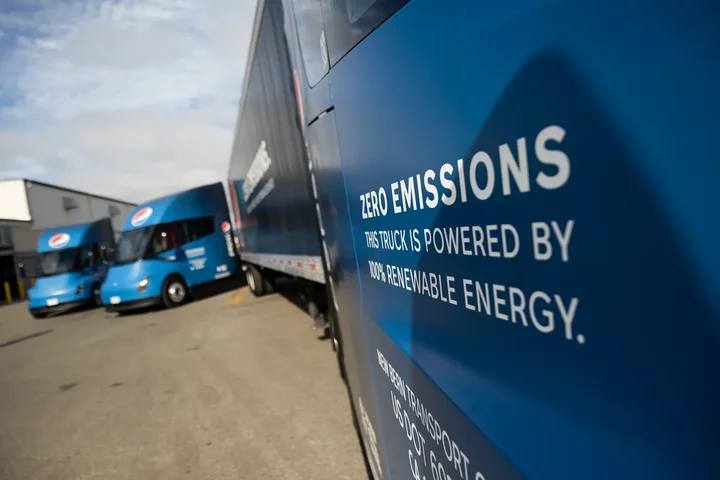A fleet of new Tesla big rigs was on display at PepsiCo’s Sacramento facility on April 11, 2023. Photo by Miguel Gutierrez Jr., CalMatters.
Truck manufacturers won’t file legal challenges over California’s controversial mandate, and in return, the state air board will relax some smog-fighting requirements.
California and major truck manufacturers announced a deal today that would avoid a legal battle over the state’s landmark mandate phasing out diesel big rigs and other trucks.
In return, the Air Resources Board will relax some near-term requirements for trucks to reduce emissions of a key ingredient of smog to more closely align with new federal standards.
“It’s great to have them not suing and not helping others in lawsuits,” said Steven Cliff, the air board’s executive director. “But more important is we ensure that we’re getting the actual reduction benefits associated with the rules.”
The powerful Truck and Engine Manufacturers Association as well as 10 manufacturers, including Cummins, Inc., Daimler Truck North America, Volvo Group North America and Navistar, Inc. signed on to the deal.
“Both (the California Air Resources Board) and we realized that, through these discussions, there was an opportunity for CARB to realign with the (U.S. Environmental Protection Agency) starting in 2027. And that’s really what led to our sitting down and coming to this agreement,” said Jed Mandel, president of the Truck and Engine Manufacturers Association.
Starting in 2036, no new fossil-fueled medium-duty and heavy-duty trucks will be sold in California under a regulation approved by the air board in April. All new models will have to instead be zero-emissions. Large trucking companies also must convert existing fleets to zero-emission electric or hydrogen models by 2042.
“It’s great to have them not suing and not helping others in lawsuits. But more important is we ensure that we’re getting the actual reduction benefits associated with the rules.”
— Steven Cliff, executive director of the California Air Resources Board
While manufacturers are now supporting California’s rules, trucking companies have vigorously opposed them, saying zero-emission big rigs can cost more than twice the cost of a diesel truck, take hours to charge, can’t travel the range that many companies need to transport cargo and lack a sufficient statewide network of charging stations. A top executive of the trucking industry had predicted economic chaos and dysfunction and said the mandate is likely to “fail pretty spectacularly.”
Vehicle pollution battles are high stakes in California: Under the federal Clean Air Act, the state has the unique authority to set vehicle emissions regulations that are stricter than the federal government’s. More than a dozen other states usually choose to follow California’s lead.
Engine manufacturers fought against an earlier state truck rule, enacted in 2020, that cut smog-forming pollutants from medium and heavy duty trucks, warning that the rule was not cost-effective and would harm California’s economy.
When the federal Environmental Protection Agency adopted its own rules to cut smog-forming pollutants from trucks in December 2022, manufacturers were faced with the possibility of a split market, with California enacting different rules.
Under the new agreement, California will bring its 2027 standards for smog-forming nitrogen oxides more in line with the federal version.
Truck and engine manufacturers also will be allowed to sell a higher percentage of older diesel technology that isn’t as clean burning between 2024 and 2027, provided they offset the emissions, such as by also offering up a comparable number of zero-emission engines. The air board also agreed to give manufacturers four-years warning before implementing new clean trucks rules.
In return, the truck manufacturers agreed not to sue over California’s suite of clean trucks rules or weigh in on lawsuits brought by other parties, and said that they would follow the rules regardless of how any other lawsuits resulted. If trucking companies sue the state, for instance, they won’t have the support of truck engine manufacturers, a powerful group.
The agreement calls for changes to the state’s current rules that will still require a formal rulemaking process and a vote of the board. Cliff said the staff has a strong case to make to the board about the changes.
Danny Cullenward, an energy economist and research fellow with American University, said the agreement is an unusual strategy, but given the legal uncertainty of a lawsuit in the current federal court system, he understands the rationale.
“It’s kind of like regulating through contract, which is a little weird,” said Danny Cullenward, an energy economist and research fellow with American University. “Deals get made all the time. This one is just written down in advance.”
California has struck similar deals before, when the state crossed swords with the Trump administration over its power to set greenhouse gas limits for tailpipe pollution.
Cullenward said the move makes it less likely that California’s clean truck efforts will become mired in lawsuits that eventually end up in front of the Supreme Court.
“The Supreme Court has gone from conservative to reactionary and aggressive, and I mean, lawless,” Cullenward said. “There’s more to be said, practically, from avoiding that drama.”
###
CalMatters.org is a nonprofit, nonpartisan media venture explaining California policies and politics.

CLICK TO MANAGE